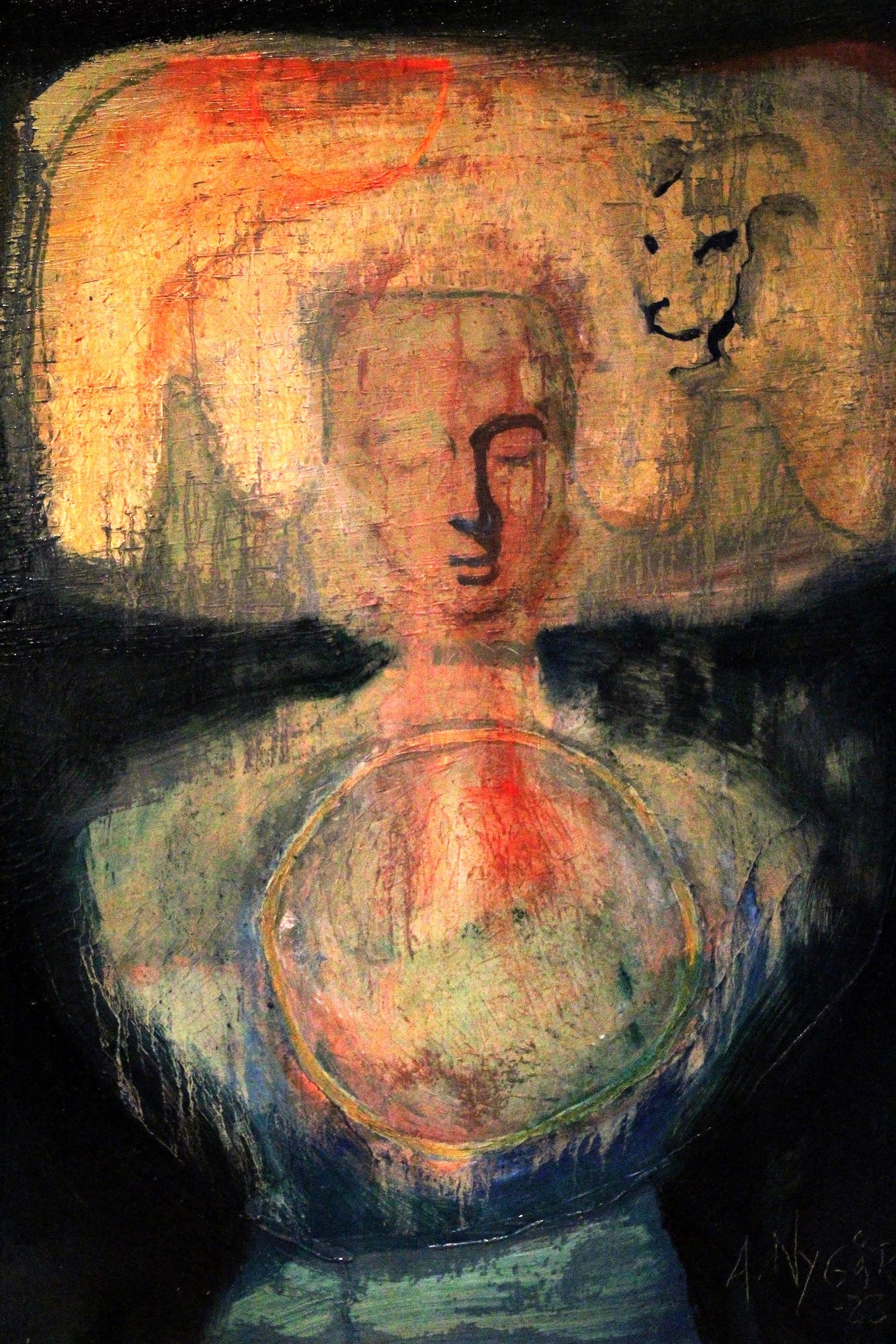Art by Anne Nygård
You have heard before that you are made of ‘parts.’
You may have explored ‘parts work.’
You know you have ‘body parts.’
You likely know the feeling of your life as a movie, playing your ‘part.’
Whether this is a useful kind of orientation or not is a different question.
It’s a summer night.
I go out in the heat in shorts and undershirt, lazily swinging a large metal water bottle through the air. By accident it strikes the side of my leg just right so that it glances off the set of keys in my pocket, then continues arcing forward and up.
Bongggggggggggggggggggggggggg
This sound resonates through splashing water inside the cylinder to electric effect.
So I keep swinging it, exploring my discovery, playing with sound and movement.
I am enjoying myself when a nearby human being catches my eye. A story springs from nowhere and rearranges every cell in my body.
Watch out!
I don’t actually think these words, but my animal body hears the command. I become watchful, guarded and subtly ashamed of myself.
Noticing all that, I then get indignant, and second-guess my body:
But WHYYYY?!
Aha! Now I have the opportunity to write a detective novel . . . and I am the villain!
This ‘part’ of this story could go forever. But tonight I realize I have a different choice.
I think:
My body can do this without me. I don’t have to talk.
I suggest you try on this thought from time to time.
After pronouncing those words, resolve not to pronounce any more words. Not out loud, nor in mental space. Just let your body take the steering wheel.
This is not an invitation to irrational behavior. But it will likely heighten awareness of whether or not you trust your body.
BTW, notice how this language makes ‘you’ and ‘your body’ into two separate ‘parts’!
Now suppose you are just a body - an intelligent one, but nothing more.
You can pretend you have no access to human narrative. You try on the idea that there is literally no need for inner speech to move successfully through the world.
Of course, as in traditional meditation, this may turn out to be easier said than done, but this is the intention and you keep returning to it.
My body has chosen for me. I cross the street.
Now I feel that ‘watch out’ feeling passing through me again. Now, another word speaks into psychic space.
Deviant.
Just try telling your inner voice to shut up. It’s easier “said than done.”
(which is a really funny phrase if you stop to think about it)
But you can just watch what it does instead of thinking that it’s an authority figure.
Deviant.
I see how easily I could write this movie script. Scenes from throughout my life volunteer themselves in my mind, reinforcing the narrative:
I’m an ‘outsider.’
I might disturb other pedestrians in the night. They’ll see I’m not “one of them.”
As I walk, I feel the shape and weight of this particular ‘hero’s journey.’
At the same time I hear a “witness” voice telling me to grow up and transcend my ego, my old patterns, etc.
And there is plenty more here should I choose to indulge it.
But running complicated stories in your mind like this puts your body in a cage.
So I try on an alternate narrative, again inviting words to drop away.
My body has decided to cross the street. No other justification is needed.
I feel looser, more comfortable now.
It wasn’t hard to do. But it feels like a leap of faith.
Spend some time watching a child, a dog, a bug or a bird:
How much effort do you see in their movement?
Do they look disoriented? Anxious?
How well do they recover from mistakes?
Does it look they need to talk to themselves in order to act?
Do they appear to trust their bodies?
I recently posted a video of a walking exercise you can do to help quiet inner speech.
There is also a simple but powerful meditation you can do that I learned from
. She calls it “still hunting.”Sit or stand in front of a window or some other convenient frame like a doorway or the space between two trees.
Gaze into the center of the frame with your eyes soft and wide. Don’t chase any movement that happens in the frame.
A bird flying by. Rainfall. A car driving by. Doesn’t matter.
Eyes soft and wide. Don’t chase.
Allow the body to expand in all directions. Breathe simply.
Notice the furthest points to both your left and right which you can simultaneously see without moving your eyes. Stay connected to both of them.
Stay here.
Eyes soft and wide. Don’t chase.
The work required with your eye muscles to maintain this posture may take some getting used to. But with practice, you can develop this vocabulary and posture of wordlessness and it will get easier.
It’s worth practicing.
As a recap, there are now three levels of this practice:
Bonnie’s Still Hunting meditation
Take the leap of faith: remove inner dialogue, trust your body to make decisions for you
This ‘leap of faith’ is also an idea from Bonnie. If you find this stuff useful, definitely check out the
.If you’re curious about working with me, click here to earn more about my 16-week group coaching program Grounded Connection.






Strong like wind
Soft like mountain
Slow like a lioness
Sharp like dewdrops
Dark as the fallen snow
Very vivid description of your summer night walk. Thank you for Bonny's meditation. I've got great windows for this. I also enjoyed your walk through the woods.